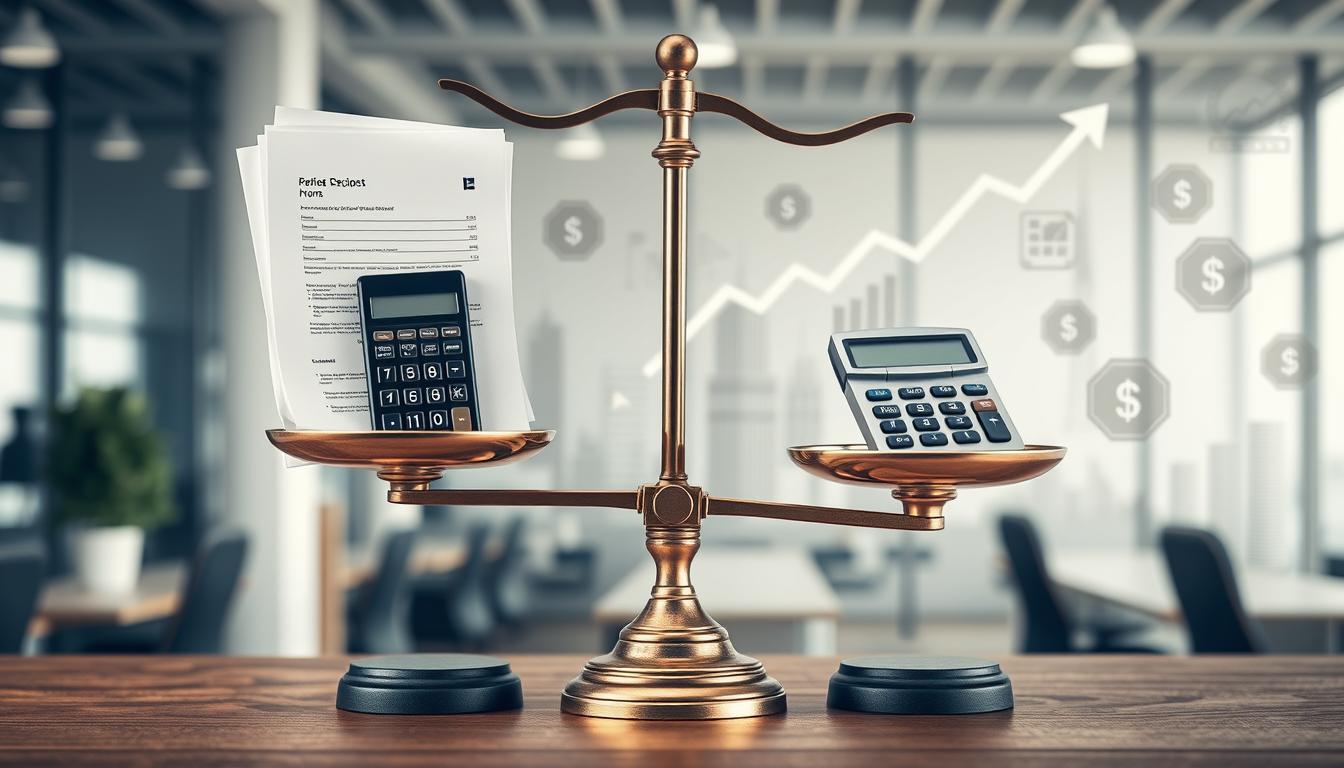How to Price a Business for Sale – Expert Guide

Selling a business is a big moment for entrepreneurs. But figuring out the right price is hard and scary. I’ve been through it and know all about the many things that affect a company’s value.
We’ll look into how to value a business in this detailed guide. We’ll cover the basics, special considerations for different industries, and how to price your business step by step. This guide is for anyone selling a business, whether you’re experienced or new to it.
Key Takeaways
- Understand the key components that determine a business’s worth, including market conditions, industry-specific factors, and financial performance.
- Explore the most widely used business valuation methods, including asset-based, market, and income-based approaches.
- Learn how to analyze financial statements and performance metrics to uncover the true value of your business.
- Discover strategies for assessing the worth of tangible and intangible assets, including equipment, inventory, intellectual property, and brand value.
- Gain insights into working with professional business appraisers to ensure an accurate and objective valuation process.
Understanding Business Valuation Fundamentals
Figuring out a business’s value is complex. It involves knowing many factors that affect its worth. At the heart of this are the key parts that make up a company’s value, the impact of market conditions, and special considerations for each industry.
Key Components of Business Worth
A business’s value isn’t just about its money-making abilities. It’s a detailed look at many things, like its assets, debts, intellectual property, brand, and management team’s skills. These things together show what a business is really worth to buyers.
The Role of Market Conditions
Market conditions are very important for business valuation. Things like the economy, industry growth, competition, and supply and demand can change how much a company is worth. It’s key to understand the market well to set a fair price for a business.
Industry-Specific Considerations
The industry a business is in also affects its value. Each industry has its own rules, challenges, and how it competes. Things like market share, how easy it is to get into the industry, and where the industry is in its life cycle can all play a part in a business’s worth.
| Factors Affecting Business Value | Business Appraisal Techniques |
|---|---|
|
|
Knowing these basic parts of business valuation helps entrepreneurs and business owners get ready for a sale. It helps them get the best value for their business in the market.
How to Price a Business for Sale: Step-by-Step Process
Finding the right selling price calculation for your business is key. This guide will walk you through the steps to value a company and set a price that’s both fair and competitive.
- Gather Financial Documents: Start by collecting your business’s financial statements, tax returns, and other important financial records. These will be the base for your valuation.
- Conduct Market Research: Look into the market for businesses like yours. Check out recent sales, industry trends, and what your competitors are doing. This helps you understand the market.
- Apply Valuation Methods: Use different methods like the asset-based, market, or income-based approach to find your business’s true value.
- Consider Intangible Assets: Don’t forget to value your business’s intangible assets like intellectual property, brand, and goodwill. They can greatly affect your business’s worth.
- Adjust for Risk and Growth Potential: Think about any risks or growth chances that might change your business’s value.
- Consult with Professionals: Get help from business appraisers, accountants, or financial advisors. They can make sure your valuation is thorough and accurate.
| Valuation Approach | Description | Key Considerations |
|---|---|---|
| Asset-Based Approach | Looks at the value of your business’s assets, like equipment, inventory, and intellectual property. | Good for companies with lots of physical assets or those planning to liquidate. |
| Market Approach | Compares your business to similar companies or industry standards. | Needs good comparable businesses and market data. |
| Income-Based Approach | Values your business based on its future earnings or cash flow. | Needs solid financial forecasts and the right discount rate. |
By following these steps, you can find a competitive selling price calculation for your business. This ensures a smooth sale and fair valuation of a company for everyone involved.
Essential Business Valuation Methods
Understanding the different ways to value a business is key when selling. There are three main methods: asset-based, market, and income-based. Each gives a unique view of a business’s worth.
Asset-Based Approach
This method looks at a company’s physical and intangible assets. It includes things like equipment, inventory, and intellectual property. It’s great for businesses with lots of physical assets or those going through liquidation.
By valuing these assets, you get a clear picture of the business’s net worth.
Market Approach
The market approach compares your business to similar ones that have sold recently. It looks at their sales prices and financial metrics. This helps understand the business’s value in the current market.
Income-Based Approach
This method focuses on the business’s future earnings. It considers past financials, future cash flows, and the right discount rate. It gives a forward-looking view of the business’s worth.
Each method has its own strengths and weaknesses. The best approach often combines them. Knowing the pros and cons helps business owners and buyers make smart decisions.
| Valuation Method | Key Considerations | Advantages | Limitations |
|---|---|---|---|
| Asset-Based Approach | Fair market value of tangible and intangible assets | Suitable for businesses with significant physical assets or undergoing liquidation | Does not account for future earning potential |
| Market Approach | Comparison to similar recently sold businesses | Provides insights into current market conditions and industry trends | Requires availability of comparable sales data |
| Income-Based Approach | Projected future cash flows and appropriate capitalization or discount rate | Focuses on the business’s earning potential | Relies on accurate financial projections and assumptions |
Analyzing Financial Statements and Performance Metrics
When figuring out a business’s worth, it’s key to look closely at its financial statements and important performance signs. This detailed check gives us a clear view of the company’s financial state, how well it runs, and its chance to grow. These are all big parts of cash flow projections and determining fair market value.
The income statement, balance sheet, and cash flow statement are the main financial reports. They help us understand the business’s financial health. Looking at things like gross profit margin and return on assets tells us about the company’s success and how well it uses its resources.
| Financial Statement | Key Metrics |
|---|---|
| Income Statement |
|
| Balance Sheet |
|
| Cash Flow Statement |
|
Also, looking at special metrics for the industry can tell us a lot. For example, how much it costs to get a new customer and how well employees work. These show how the company does compared to others.
“Analyzing financial statements and key metrics is a critical step in accurately determining fair market value and cash flow projections for a business.”
By really digging into the company’s financial reports and performance signs, we can understand its financial health and growth chances. This is crucial for setting a fair and true value for the business.
Determining the Value of Tangible and Intangible Assets
Figuring out a business’s value means looking at both its physical and non-physical assets. This step is key to understanding a company’s true worth.
Equipment and Inventory Assessment
The worth of a business’s physical stuff, like equipment and inventory, is important. Checking these assets’ condition, age, and market value helps set a base for the company’s value.
Intellectual Property Valuation
In today’s world, a company’s knowledge and ideas are very valuable. Things like patents, trademarks, copyrights, and trade secrets need to be looked at closely. This helps figure out how much they add to the company’s value.
Brand Value Considerations
A good brand can make a company more valuable. It’s important to check the brand’s reputation, how loyal customers are, and its place in the market. This helps understand how much the brand adds to the company’s value.
| Asset Category | Valuation Considerations | Impact on Asset Valuation |
|---|---|---|
| Equipment and Inventory | Condition, age, market value | Establishes a baseline for tangible asset value |
| Intellectual Property | Patents, trademarks, copyrights, trade secrets | Contributes significantly to intangible asset value |
| Brand Value | Reputation, customer loyalty, market position | Enhances the overall value of the business |
By looking closely at both physical and non-physical assets, we can really understand a company’s worth. This is key for setting a fair price when selling a business and making sure the deal is right.
Market Research and Comparable Sales Analysis

Finding the fair market value of a business is key in the appraisal process. To get an accurate value, you need to do deep market research and look at similar sales. This method gives insights into the industry and helps set a realistic price.
When doing market research, look at businesses that have sold recently. This comparable sales analysis shows the market’s current state and trends. It helps understand what makes a business valuable.
- Find Similar Businesses: Look for businesses in the same field, area, and size as yours. Find recent sales to get current data.
- Check Key Metrics: Look at the financials, revenue, and profits of these businesses. This shows how your business compares and what might affect its value.
- Consider Market Conditions: Look at the economy, industry trends, and outside factors that might have changed sale prices. This helps adjust your valuation for today’s market.
Using market research and comparable sales analysis in your appraisal makes your valuation more accurate. This data-driven method is vital for a fair and successful sale.
“Conducting thorough market research and analyzing comparable sales data is crucial for determining an accurate and fair valuation of a business.”
Adjusting for Risk Factors and Future Growth Potential
When figuring out a business’s value, it’s key to think about different risks and growth chances. This detailed look can change the final value a lot. It makes sure the company’s worth is shown clearly.
Economic Climate Impact
The state of the economy greatly affects a business’s value. Things like interest rates, inflation, and market trends can make a company seem more or less valuable. It’s important to study the economy and its effect on the business’s money flow to get a good value.
Industry Trends Evaluation
The type of business a company is in also matters a lot. Knowing about current and future trends, what customers want, and new tech can give clues about growth. This helps price the business to show it can grow and take advantage of new chances.
Competition Assessment
The competition around a business is also very important. Looking at what competitors do well or not, their share of the market, and how they might affect the business helps see where it stands. This can show where the business can grow or where it might face challenges.
By looking at these risks and growth chances, owners and appraisers can get a more accurate value. This way, they consider all important factors. This leads to a better and more solid price for the business.
Working with Professional Business Appraisers

Working with professional business appraisers is key to determining the fair market value of a business. They bring expertise and tools to accurately assess business valuation methods. This ensures a fair deal for everyone involved.
Professional appraisers offer many benefits. They give a detailed and unbiased look at your business. They consider financials, assets, industry trends, and market conditions. This helps you make smart decisions and set a selling price that matches your business’s value.
The appraisal process involves a deep dive into your company’s finances and operations. The appraiser uses business valuation methods like asset-based, market, and income-based approaches. They aim to find the fair market value of your business.
- Comprehensive analysis of financial performance and asset valuation
- Evaluation of industry trends and market conditions
- Utilization of various business valuation methods to determine fair market value
- Objective and unbiased assessment of your business’s worth
- Guidance on negotiating a selling price that reflects the true value of your business
By teaming up with a professional appraiser, you ensure your business’s fair market value is right. This sets you up for a successful sale and a smooth transition to your next venture.
| Benefit | Description |
|---|---|
| Comprehensive Analysis | Thorough review of financial performance, asset valuation, industry trends, and market conditions. |
| Objective Assessment | Unbiased evaluation of the business’s worth using various business valuation methods. |
| Guidance on Pricing | Assistance in negotiating a selling price that reflects the fair market value of the business. |
Conclusion
When pricing a business for sale, a detailed and accurate valuation is key. Knowing how to value a business helps entrepreneurs set a fair price. This makes the selling process more attractive.
This guide covered what makes a business valuable, the impact of market conditions, and industry specifics. It also looked at different valuation methods. These include asset-based, market, and income-based approaches. This gives a clear way to find a business’s true worth.
Starting to sell your business? Keep in mind the many factors involved, like risk and growth potential. Getting help from professional appraisers is very helpful. They make the process easier and ensure a fair deal. By learning how to price your business and understanding valuation methods, you’re ready for the next step in your business journey.
FAQ
What are the key components that determine the worth of a business?
The worth of a business depends on several things. These include its assets, like buildings and ideas, and how much money it makes. It also looks at cash flow, growth chances, and the market. The company’s reputation and how it stands out in the market also matter a lot.
How do industry-specific considerations affect business valuation?
The type of business you’re in can really change how much it’s worth. Things like rules, how crowded the market is, and new tech can all play a part. Knowing these things is key to figuring out a company’s value.
What are the primary business valuation methods, and when are they most appropriate?
There are three main ways to value a business. The asset-based method looks at what the company owns. The market approach compares it to similar businesses. The income-based method focuses on how much money it makes and can keep making.
How can analyzing financial statements and performance metrics help determine a business’s value?
Looking at financial reports and important numbers gives clues about a company’s health. It shows how profitable it is and if it’s growing. This info is crucial for figuring out its value.
What role do tangible and intangible assets play in the overall business valuation?
Both kinds of assets are important. Tangible assets are things you can touch, like buildings. Intangible assets are ideas and things like brand value. Both can greatly affect a company’s worth.
How can conducting market research and analyzing comparable sales help determine the selling price of a business?
Looking at what similar businesses have sold for is helpful. It gives a good idea of what your business might be worth. This way, you can set a fair price based on real sales.
What factors related to risk and growth potential should be considered when pricing a business for sale?
When setting a price, think about the economy, trends, and competition. Also, consider how the business might grow in the future. These things can change how much someone is willing to pay.
When and why should business owners work with professional appraisers?
Getting help from experts is a good idea, especially for big or complex businesses. They have the skills and tools to do a detailed valuation. This ensures the price is fair and reflects the company’s true value.

